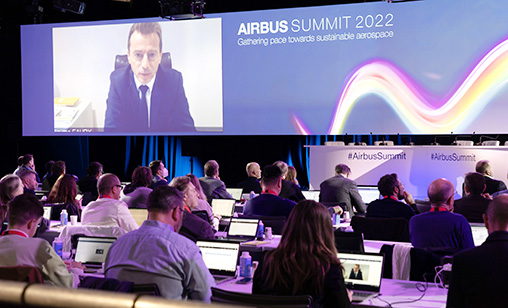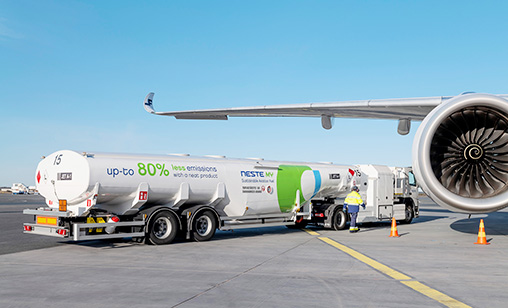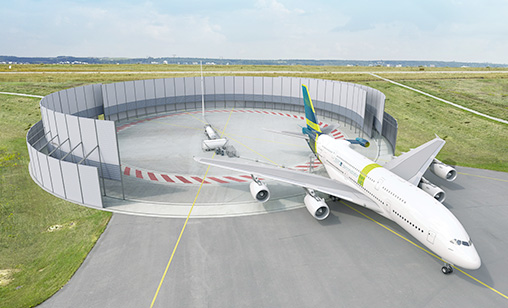News Backgrounder
Pace must quicken in race to net-zero emissions
It became clear at the recent 2022 Airbus Summit that aviation must accelerate its transformation to clean energy if its sustainability targets are to be met. Associate editor and chief correspondent, Tom Ballantyne, reports from Toulouse.
December 1st 2022
At the turn of the month, at the Airbus Summit in Touluse, Airbus CEO, Guillaume Faury, made an impassioned plea for the industry, governments and the energy sector to quicken the pace of aviation’s drive to net-zero emissions by 2050. Read More »
Held from November 30 to December 1, with the first session in Toulouse and the second in Munich, the presentations focused on the potential use of hydrogen as fuel for aircraft, increasing production of SAF (Sustainable Aviation Fuels) and development of integrated electric systems to help power big jets.
 |
| 'Is the world moving fast enough to net zero? Is the aerospace industry on track to meet its target? I think the reality is: Not yet' |
| Guillaume Faury Airbus CEO |
Faury is impressed with the way the sector has come together this year to resolve to accelerate progress on sustainability, but he declared its ambition is not yet matched by action.
“It’s all about speed and acceleration. By 2030, SAF will need to be produced at many times the level of today,” he said. “There must be more investment in refineries and production facilities and more ambitious mandates and objectives.
“Similarly, infrastructure for producing and distributing green hydrogen is in the early stages of development, but the clock is ticking for it to be in place to fuel commercial aviation by the 2030s.
“For the vision to become reality, it is clear the 2020s has to be the decade of change, profound far-reaching change and fast change.”
Faury pointed to the stark evidence of recent climate crises, from wildfires in Europe to flooding in Pakistan.
He said COP27, the recent International Civil Aviation Organization assembly where governments backed the net-zero target, influential voices had raised concerns about the environmental impact of aviation.
“We want to show that Airbus and the sector are acting on sustainability. Show what we do and where we are. What is the State of Play. Overall, it’s a mixed picture really,” he said.
Faury had intended to personally attend the summit, but had to travel to the U.S. at short notice so he addressed the gathering via a video link.
“I believe it is difficult to overstate the scale of the energy challenge. The International Energy Agency (IEA) has said international clean energy investments will need to reach $4 trillion annually by 2030 for governments to be on track for net-zero.” he said.
“Currently, the figure is projected to reach $2 trillion by then, half of what is required. In the face of multiple crises, governments and the aerospace industry are taking collective action to tackle climate change and improve energy security. At Airbus we are pushing for even more speed.”
At the summit, Airbus announced several partnerships; each of them aimed at different facets of the sustainability fight. It signed an agreement with Neste Corporation, the world’s largest producer of SAF, to advance the use of SAF in the aviation sector. Both parties share a vision that SAF is a key solution to reduce greenhouse gas emissions from flying. This collaboration aims to accelerate the aviation sector’s transition to SAF, Airbus said.
“Neste and Airbus recognize one of the biggest challenges in accelerating SAF use is the ramp-up of SAF production. This collaboration is laying the foundation for Airbus and Neste to explore business opportunities and jointly promote the production and use of sustainable aviation fuel,” Neste said.
 |
“The focus will be on the technical development of SAF, fuel approval and testing of current and future production technologies and investigating how ‘100% SAF’ use can be enabled.”
Neste executive vice president, renewable aviation, Thorsten Lange, told summit delegates sustainability requires cooperation across the industry’s value chain. “This collaboration with Airbus connects a pioneer in the aerospace industry with a leader in renewable fuels. The combined knowledge and expertise of the companies will help advance the use and availability of SAF as a means of transitioning aviation towards more sustainable energy sources and reducing the climate impact of aviation.”
A research and development agreement also has been signed between Airbus and French automobile manufacturer, Renault Group, aimed at enhancing transversalities and synergies to accelerate the electrification roadmaps of each company.
Airbus and Renault engineers will join forces to mature technologies for energy storage; one of the main roadblocks to the development of long-range electric vehicles.
The joint project also will study the full lifecycle of future batteries, from production to recyclability, to prepare for the industrialization of these future battery designs and assess their carbon footprint across their entire lifecycle.
“This cross-industry partnership with Renault Group will help us mature the next generation of batteries as part of the Airbus electrification roadmap,” said Airbus Chief Technical Officer, Sabine Klauke.
Other agreements include the ArianeGroup, a 50/50 joint venture owned by Airbus and Safran, to build the first liquid hydrogen re-fuelling facility for ZEROe aircraft at Toulouse, Blagnac airport. The station will be in operation from 2025.
Also unveiled at the summit was a partnership with HyPort, a joint venture between ENGIE Solutions and the Regional Agency for Energy and Climate in Occitanie (AREC), a leader in the development of green hydrogen in France.
It will support development of one of the world’s first low carbon hydrogen production and distribution stations also at Toulouse Blagnac airport.
Airbus also is developing a hydrogen-powered fuel cell engine. The propulsion system is being considered as a potential solution for its zero-emission aircraft planned to enter service by 2035.
The OEM will start ground and flight testing of this fuel cell engine architecture on its ZEROe demonstrator aircraft towards the mid-2020s.
 |
The A380 MSN1 flight test aircraft for new hydrogen technologies is being modified to carry liquid hydrogen tanks and their associated distribution systems.
“Fuel cells are a potential solution to help us achieve our zero-emission ambitions. We are focused on developing and testing this technology to understand if it is feasible and viable for a 2035 entry-into-service of a zero-emission aircraft,” Airbus vice president, Zero-Emission Aircraft, Glenn Llewelllyn, said.
None of the above will be easy. To have airlines flying hydrogen planes in the second half of the next decade, it will need to have a plane developed, Faury said.
“This is in our hands. It is probably not the most difficult part of the equation. We will need to have a regulatory framework,” he said.
“What happened at ICAO will help, but there are many more regulations needed to be changed to use hydrogen, to certify planes using hydrogen and to distribute hydrogen.
“In that scenario, we are trying to collaborate, to involve all the parties to drive that change. We are participating in a number of multi-sectorial organizations and companies to drive that regulatory framework.
“The ability or lack of ability to have clean hydrogen in the right quantities, at the right price in the second half of the next decade is a big concern for me.
“It is why we are acting a lot with the energy sector to understand and to drive hydrogen for planes. We think starting with ships and starting with planes makes a lot of sense for the energy sector.”
Faury said if a hydrogen powered aircraft is to be officially launched in 2027 or 2028, for entry into service in 2035, but there is a situation where there is no certainty there will be enough hydrogen in the right place at the right price [for the launch], it could be a reason to delay the launch of the aircraft.
megan moroney says:
January 27th 2024 05:31pm